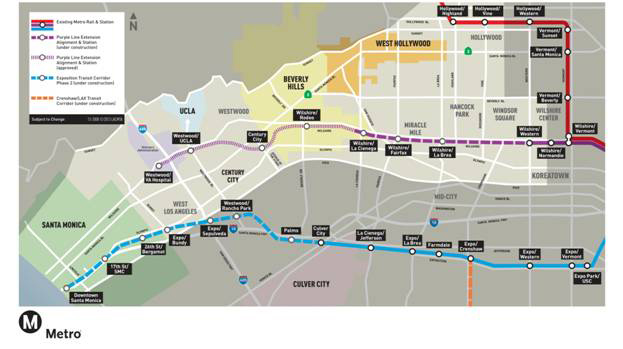WESTWOOD—Metro plans to begin building the subway Purple Line Extension to Westwood in 2018 and complete construction by 2024, 9 years ahead of the original schedule, according to an announcement made on Friday, May 19.
In November 2016, county voters approved Measure M, which expanded upon Measure R, a half-percent sales tax increase approved by voters in 2008, expediting existing projects. The estimated $860 million allocated by Measure M will help to fund the extension and make a sooner completion date possible, allowing the subway to be built in three phases. Measure R accounted for 3/4th of the total funding.
Collected over 30 years, Measure R provides funding for transportation purposes, including transit and highway projects, as well as bus and rail operations. The project is also funded by federal “New Starts” matching funds, as well as a low-interest loan from the U.S. Department of Transportation’s Transportation Infrastructure Finance and Innovation Act (TIFIA) program. The total cost of the project would be $6.3 billion.
The line currently runs from Union Station in Downtown to Western Avenue. The extension would run from Wilshire/Western to Veterans West Los Angeles Medical Center. The city hopes the new 2024 completion year could be a selling point for bid of the 2024 Summer Olympics.
According to RadPad, an apartment-hunting site, rent prices around planned Metro stations increased by up to 45 percent between 2015 and 2016.
The Purple Line Extension project faced obstacles in the past that would have jeopardized its completion. For 5 years, Beverly Hills and the local school district spent over $10 million to stop construction plans, citing concerns about tunneling in an area studded with pockets of methane gas and the Metro’s lack of care in addressing the effects of construction on air quality and recreation at the high school. In 2016, Judge George H. Wu ruled against the city and allowed construction to continue.
There are three phases to its construction:
Section 1: Wilshire/La Brea, Wilshire Fairfax, Wilshire/ La Cienega
Section 2: Wilshire/ Rodeo, Century City/ Constellation
Section 3: Westwood/ UCLA, Westwood/ VA Hospital
The first section began construction in 2015. The extension, which would extend for 9 miles westward along Wilshire Boulevard with seven new stations, would allow passengers to travel from Downtown to Westwood in 25 minutes.
In January 2009, the Metro Board of Directors approved the Draft Environmental Impact Study/Environmental Impact Report (Draft EIS/EIR), which analyzed five subway alternatives. By spring 2009, the Draft EIS/EIR began to examine impacts of these alternatives during construction and operation, including mitigation measures. The process ended in October 2010 with the Metro staff recommendation for a Locally Preferred Alternative (LPA).
In April 2012, the Metro Board of Directors certified the Final EIS/EIR and approved the first phase of the project extending to La Cienega. In May 2012, the Board approved the second and third phases extending to the Westwood/VA Hospital.
The extension would add 43,000 daily weekday boardings at the seven new stations, according to a report from the Final EIS/EIR. Opening the new trainline would add 78,000 new daily trips on the full Metro Rail Station.
Metro will fund one full entrance at six of the seven stations and two full entrances at the Westwood/UCLA station due to the expectation of high volumes of boarding there.
Metro’s Real Estate Department has begun acquiring the properties and underground easement needed for the first section of the subway. The state has required Metro to provide just compensation to property owners for use of their properties, including temporary and permanent easements.
According to the Metro website, few, if any, expected impacts resulting from the extension will be felt from tunnel construction. During construction, impacts will be limited to trucks hauling building materials and excavated soil on designated haul routes. Tunnels are bored completely below ground utilizing the latest tunneling technology to reduce as much impact as possible. Metro has provided a Mitigation Monitoring and Reporting Plan that outlines steps to reduce impact during construction.
The Final ETA/EIR found three locations that would encounter noise and vibration from subway operations that would exceed the threshold set by the Federal Transportation Agency, but these impacts can be fully mitigated. These locations are an apartment building near La Brea, the Wilshire/Ebell Theater near Crenshaw Boulevard, and the Saban Theater near La Cienega.
Constructing the extension will generate 52,000 jobs within the region, according to the Los Angeles Economic Development Corporation in June 2012.






